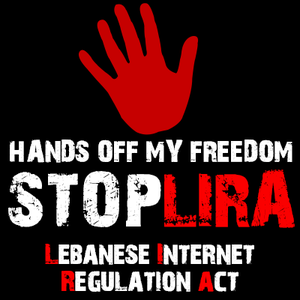The Lebanese Internet Regulation Act, or LIRA as referred to by Internet users, is the brainchild of Mr. Walid Daouk, the Lebanese Minister of Information. The nine-article Act is designed to regulate the Internet and protect its users, although Lebanese bloggers think otherwise.
Protesters have launched a far-reaching online #StopLIRA campaign, following on from previous #StopPIPA and #StopSOPA examples which took the Internet by storm in January, aiming to gain both national and international support to stop the government from passing the law.
"Stop LIRA, before they stop you", tweeted prominent Lebanese blogger Imad Bazzi (@TrellaLB).
Magda Abu-Fadil, Director of Media Unlimited, belives that one of the reasons behind the Minister's Act could be "pressure from traditional media that haven't kept up with the times". Abu-Fadil also added that traditional media outlets "see their revenues dwindling and advertising dollars moving online and are putting pressure on the government to secure their piece of turf."
The draft is being criticized for it's loose wording and vague statements. In the 1st Article, the law prohibits the publication of “anything that offends public morals and ethics”, without providing a definition of what is ethical and what is moral.
"The act subjects the electronic media to the 1963 Publications Code, and to the 1994 Audiovisual Code" says Ayman Mhanna, Executive Director at the Samir Kassir Foundation. "How can you apply on the Internet laws that were enacted before the very invention of the Internet."
The Act also suggests that all websites (including blogs) should appoint an "official manager" with address and contact details in Lebanon, as well as obliging websites and blogs to register with the Ministry of Information.
Furthermore, individuals are allowed to run only one website/blog at a time, and in order to run a website or blog a person will be required "not to possess judicial immunity" or have been presently or in the past "convicted of a misdemeanor or a felony."
The initial attempts to regulate the internet in Lebanon were made by the National Audiovisual Media Council in November 2011, but after a public uproar against the measure, the Minister of Information stopped the NAMC and suggested drafting a new text himself.
"Let us not wait for the government to submit a new draft." says Mhanna. Adding that "We can all work together to discuss what potentially can be accepted in terms of regulation and what are our red lines that we will never accept, and come up with an alternative text, that fully guarantees freedom of expression."
For the Arabic original version of the Act, published by An-Nahar, please click here.
For the English version of the act, translated and published by Lebanese blogger Joseph Choufani, please click here.
To watch the #StopLIRA video, click here.




